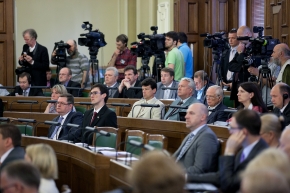 Gallery
Gallery
On Thursday, 21 June, the Saeima in the third and final reading adopted amendments to the Law on Taxes and Fees, thus improving the legal framework aimed at limiting illegal cash flows by improving the prevention of tax evasion and streamlining tax control and administration.
The amendments set forth further limitations on cash transactions; namely, legal entities will be obliged to declare all cash transactions performed in the previous month above the threshold of 1,000 LVL (formerly 3,000 LVL). Furthermore, the threshold of permissible value of transactions in cash has been reduced from 10,000 LVL to 5,000 LVL.
In order to limit the illegal cash flow stemming from unregistered employment and grey economy, merchants also will have to declare transactions above the threshold of 2,000 LVL, including transactions with natural persons that are exempt from the obligation to register with the State Revenue Service (SRS) as performers of economic activities.
To prevent offshore companies from avoiding registration of permanent representative offices in Latvia and paying taxes from earnings gained in Latvia, the amendments stipulate that the term taxpayer will also refer to persons duly authorised to conclude contracts on behalf of natural, legal or other persons located, established or registered in low-tax or tax-free jurisdictions.
The amendments also set forth the tax administration’s obligation to maintain a list of high-risk addresses, i.e., a list of locations used for illicit activities aimed at tax evasion. Thus the SRS will be authorised to suspend a merchant’s operations upon identifying the pre-defined risk factors.
The SRS will also be authorised to suspend operation of companies which employ more than a half of their employees without an employment contract, evade taxes, deliberately falsify accounting data, make payments to employees without revealing the fact in the accounting books or reports on mandatory social insurance contributions. Operation of a company will also be suspended if it fails to rectify non-compliance related to VAT payments. The SRS will lift the suspension only after all instances of non-compliance are eliminated.
The SRS will publish information about the suspended companies on its website and make appropriate entries in the Commercial Register. Therefore, before performing transactions above the threshold of 1,000 LVL, merchants will have to verify whether their partner’s operation has not been suspended.
Besides, taxpayers will be obliged to provide the SRS with proof of the transaction value against the market value if the transaction value exceeds 10,000 LVL and if the merchant’s annual net turnover exceeds one million lats. To simplify this task, the amendments provide for a coordination procedure and stipulate the data required to determine the value of the relevant transaction.
Saeima Press Service







